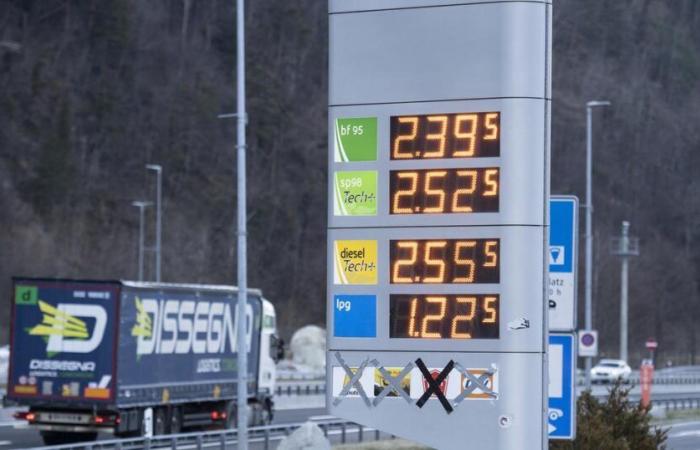The question of financing new motorway lanes resurfaces, as revealed in the German-speaking press this weekend. As the Swiss prepare to vote on November 24 on the widening of six motorway sections, the Confederation cannot guarantee that this work will be done without new taxes.
Two weeks before the vote on motorway widening, controversy erupted over whether the investment of nearly five billion francs would lead to higher gasoline costs. In the little red booklet, the Confederation refuses to affirm that this project would be carried out without an increase in taxes.
Indeed, as the SonntagsZeitung reports, Albert Rösti’s Federal Department of Transport (UDC) wanted to specify in the voting booklet that the extension could be carried out without new or additional taxes. In this version, the Confederation would draw on the FORTA fund for national roads, without having to resort to a new tax to fund it further.
>> Review the 7:30 p.m. topic on the history of the motorway network: A look back at the history of motorways in Switzerland. A network dating from 1959, which has greatly developed over time, but which continues to be saturated
Reaction from the Finance Department
But the Federal Department of Finance, headed by Karin Keller-Sutter (PLR), removed the section from the red book “without new or additional taxes”, writes the SonntagsZeitung. He would be more cautious, the final text therefore not specifying whether these adjustments will be made without new taxes or not.
However, the risk of paying more for gasoline does exist. In its message on the project, the Federal Council itself wrote two years ago that taxes on mineral oils should be increased in the medium term, because the reserves of the road fund were decreasing. And it is in particular through this surcharge on mineral oils, paid by users of thermal cars, that the road fund is financed.
Albert Rösti confident
According to the law, if there were to run out of money in the fund, the price at the pump would have to increase by a few cents per liter of gasoline to ensure the financial health of this fund. This could happen as early as 2026 according to projections made by the Federal Council a year and a half ago. In figures, if these reserves are less than 500 million francs, the price of gasoline will have to be increased by four cents per liter.
The federal councilor in charge of transport, Albert Rösti, is more optimistic. According to him, if the price of gasoline were indeed to be increased, it would not be because of the extension of highways. He recalls that the price of fuel is in any case volatile due to the geopolitical situation, and that it could also avoid under-coverage of the road fund. He added that a new tax on electric vehicles from 2030 would ultimately make it possible to maintain a sufficient financial contribution to the fund.
In the Forum show on Sunday, Johanna Gapany, Friborg PLR State Councilor, affirmed for her part that it was “absurd to think that tomorrow we should increase taxes on gasoline” because, according to her, the FORTA fund is “over-endowed and with growing reserves.” An opinion which is not shared by Fabien Fivaz. The Green national councilor from Neuchâtel considered that the road fund “had its limits”. For him, “if we do not increase the price of gasoline, we will make trade-offs elsewhere”, including new infrastructure for urban areas.
Radio subject: Philéas Authier
Web writing: itg






